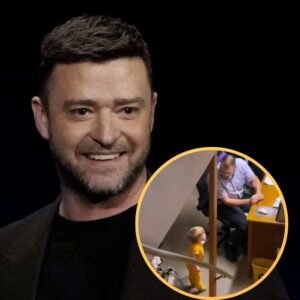On “Everything I Thought It Was,” his sixth solo album, this artist feigns new vulnerability but relies on old tricks and his ’N Sync bandmates.

Shortly before writing the song that would become his first single in six years, Justin Timberlake worked with his musical director Adam Blackstone on an arrangement of John Lennon’s “Jealous Guy,” in the style of Donny Hathaway’s famous cover.
As they rehearsed the version that Timberlake would sing at a small jazz club where Blackstone had a residency, they discussed the song and, as Timberlake recounted in a recent interview with Zane Lowe, “the idea that you just don’t hear that from men often — that they would express an emotion that makes them vulnerable.” Inspired by Lennon and Hathaway’s soul-baring, the lyrics to “Selfish,” the lead single from Timberlake’s new album, “Everything I Thought It Was,” began to pour out.
A truly vulnerable Justin Timberlake — one stripped of the Teflon charm that has coated his music and career thus far — is a tantalizing concept, especially at this moment. In the years since his minor 2018 misstep “Man of the Woods,” Timberlake’s image has tarnished somewhat. Audiences are reconsidering mid-2000s pop cultural events like the Janet Jackson wardrobe malfunction seen ’round the world at the Super Bowl halftime in 2004, and the media’s cruel treatment of Britney Spears, Timberlake’s ex-girlfriend.
In February 2021, amid the re-evaluation of Spears’s career and nearing the end of her court-ordered conservatorship, Timberlake posted a long, since-deleted statement on Instagram, apologizing specifically to Jackson and Spears. He added, “I am deeply sorry for the times in my life where my actions contributed to the problem, where I spoke out of turn or did not speak up for what is right.”
Is “Selfish” a musical reckoning with all of this? Well, not exactly. The song does bear some sonic hallmarks of introspection: It’s muted, minor-keyed and sung in a slightly deflated tone. But, lyrically, Timberlake seems to have confused vulnerability with humblebragging. “It’s bad for my mental,” he sings in his nimble croon. “But I can’t fight it when you’re out lookin’ like you do, but you can’t hide it.” This is not exactly a soundtrack for dismantling masculine bravado: The song’s most intimate confession is that Timberlake gets jealous when other men look at his girl — and that they are always looking at his girl, because damn, she is hot.
Still, the song debuted at the respectable, if not spectacular, position of No. 19 on the Billboard Hot 100, and, after he performed it on the Jan. 27 episode of “Saturday Night Live,” it was warmly received by one unexpected well-wisher. “I am in love with Justin Timberlake’s new song ‘Selfish,’” Spears wrote on Instagram the next day, in a post where she also apologized “for some of the things I wrote about in my book.”

Justin Timberlake and Britney Spears split in 2002.Credit…Lucy Nicholson/Agence France-Presse — Getty Images
Though Timberlake comes off better than her ex-husband, Kevin Federline, or any member of her family in “The Woman in Me,” the best-selling memoir Spears released on Oct. 24, its publication prompted even more fresh scrutiny of his image. Spears’s olive branch felt generous — an opportunity for Timberlake to begin the promotion of his comeback album without the aura of villainy.
Unfortunately, just two days after Spears’s post, he snapped that branch over his knee.
On his 43rd birthday, at an intimate free concert at Manhattan’s Irving Plaza, Timberlake introduced “Cry Me a River” — his 2002 hit that many believe to be a one-sided depiction of his breakup with Spears — with choice words captured by the many camera phones held aloft: “I’d like to take this opportunity to apologize,” he paused before adding, “to absolutely [expletive] nobody.”
In some sense, that bitter, prickly sentiment feels more vulnerable than anything revealed on his latest album.
Excess and grandiosity waft through every Justin Timberlake release; he has never made an album under an hour long. Early in his career, his ambition helped clip the puppet strings of his boy band image and establish him as a serious and legitimate solo artist. His penchant for collaborating with talented, imaginative producers like the Neptunes (who worked on the majority of his 2002 solo debut “Justified”) and Timbaland (who produced most of his 2006 artistic breakthrough “FutureSex/LoveSounds”) gave his music a stylish edge. But since the second volume of his “20/20 Experience,” released in 2013, Timberlake’s once expansive vision has become myopic, offering diminished returns.
“Everything I Thought It Was” is Timberlake’s longest album to date — 18 tracks spread across 77 minutes — and given that, it’s remarkable how little it has to say. Produced with an assortment of collaborators, including Calvin Harris, Cirkut and his trusty pal Timbaland, “Everything” is aggressively knob-happy, swapping out innumerable filters and coating Timberlake’s voice in every imaginable effect. The first two tracks, the morose “Memphis” and the slick “[Expletive] Up the Disco,” play as though they were made by someone who recently learned the decades-old techniques of pitch-shifting and artfully Auto-Tuning vocals, and is very excited about their discovery.
Abandoning the folksy aesthetic of “Man of the Woods,” “Everything” returns to Timberlake’s comfort zone: Gleaming, lightly profane disco jams that imagine dance-floor seduction as a kind of interstellar odyssey. The results are mixed. The fun, vampy “Play” lightly pushes the limits of wedding funk, while the less successful and unfortunately named “Infinity Sex” indulges in some of the album’s most groan-worthy lyrics (“I know the address on your mattress”). Midway through the upbeat party song “My Favorite Drug,” Timberlake breaks into a spoken word, ladies-and-fellas call-and-response that gestures back to his early hit “Señorita.” “I know I did it before,” he intones, inadvertently articulating the album’s thesis statement, “but I’mma do it again.”
Timberlake has been married to the actress Jessica Biel for 11 years, so the breakup songs scattered across the album are exercises in imagination or, as Timberlake hinted in that Zane Lowe interview, memory. He claimed that writing some of these songs allowed him to “look back at the past” and “metabolize and verbalize my perspective on it.” He added, “I don’t think I’ve ever really done that before.”
That quote, however, oversells the maturity of the material. The murky, mid-tempo “Drown” is basically “Cry Me a River, Part II,” a chronicle of a relationship’s dissolution that pins all the blame on the other person. “Got caught up in the tide of all the tears you cried,” Timberlake sings in his most wounded falsetto. “Flame,” which swaps overextended water metaphors for overextended fire metaphors, revolves around a nagging hook: “Remember-member-member when you said you’d love me til you died?” He never specifies which part of his past he is looking back on, but plenty of listeners will be more than willing to speculate.
Image

Despite having been married to the actress Jessica Biel, right, for the past 11 years, Timberlake penned breakup songs for his latest album that allowed him to “look back at the past.”Credit…Lee Smith/Action Images, via Reuters
The crowd at Timberlake’s Irving Plaza show was populated mostly by Millennials; they sipped an expensive specialty cocktail called the Señorita and, before Timberlake came onstage, danced to a D.J. set full of the sort of Y2K-era pop that would have played at their (full disclosure: our) 8th grade dances. Nostalgia was the mood of the hour, and Timberlake was mostly content to party like it was 1999, breaking the spell only to update some of his signature hits with bits of trap cadences and triplet flow.
What do people actually want from Justin Timberlake in 2024? Maybe it is precisely what he offered at that Irving Plaza show: For him to play the hits (or, in the case of these new songs, relatively rote imitations of them) and whisk them back to a simpler time when boys would be boys and a roguishly charming guy could grin his way out of most mass-cultural controversies. Timberlake is hardly the most despicable person in show business and his greatest offense was one that, unfortunately, plenty of other artists have committed as well: Blithely benefiting from white male privilege and throwing his less charmed counterparts under the bus.
If he were still making music with the conviction and the artistry of “FutureSex/LoveSounds,” or even if he were ready to offer an honest reckoning with his past, maybe he could be forgiven. But the truth is, just as that Teflon coating is beginning to erode under the glare of cultural scrutiny, Timberlake’s music has begun to lack zest. What goes around has indeed come back around.
The penultimate song on “Everything I Thought It Was” is a sentimental ballad titled “Paradise,” on which he’s joined by the familiar voices of his ’N Sync bandmates. The track doesn’t have quite the impact it might have had ’N Sync not already reunited last fall for the somewhat inauspicious occasion of the “Trolls Band Together” soundtrack, but their harmonies nonetheless sound tight, and the song is sure to generate good-natured headlines.
When the members of ’N Sync have appeared onstage together in recent years, it has been under circumstances when Timberlake could assert his stardom and leadership. At the 2013 MTV Video Music Awards, for example, they performed a brief medley before he accepted the Michael Jackson video vanguard award as a solo artist.
This week, they reunited for a surprise performance during another of Timberlake’s smaller club shows, this time at the Wiltern Theater in Los Angeles. They were once again supporting Timberlake as a solo artist, as they do on “Paradise,” but somehow this felt different than it did at the 2013 V.M.A.s; this time Timberlake seemed more reliant upon them than he has in the past to generate attention. (This may also explain his indirect jab at Spears weeks earlier.)
Perhaps “Paradise” is Timberlake’s version of male vulnerability, and it is certainly the humblest moment on “Everything I Thought It Was.” After two decades of standing alone as a solo superstar, he knows when it’s time to ask for a little help from his friends.
News
Joey Fatone Says *NSYNC Not On Call for Justin Timberlake Amid Collaborations
Reflecting on the recent reunion at Wilton, the atmosphere was electric, filled with fun and excitement. Despite Justin Timberlake’s busy schedule with his solo album and tour, there’s hope for future collaborations and tours with *NSYNC. The conversation delves into…
Novak Djokovic Matches Rafael Nadal’s Masters 1000 Milestone
© Clive Brunskill / Staff – Getty Images Sport Novak Djokovic returned to Indian Wells after five years, entering the season’s first Masters 1000 event and matching his great rival Rafael Nadal. Novak notched his 128th Masters 1000 appearance, repeating Nadal’s feat and…
Andy Roddick criticises Novak Djokovic for ‘desperation move’ in Indian Wells controversy
Luca Nardi and Novak Djokovic after their match© PA Images Former world No 1 Andy Roddick has weighed in on the controversy that arose during Novak Djokovic’s shock defeat to Luca Nardi at the 2024 Indian Wells Open last week. The…
‘Who’s having more fun?’: Toddler and his grandpa groove to Justin Timberlake song
Avideo of a man and his grandson vibing to a classic NSYNC song has impressed social media users on a whole new level. Shared on Instagram by Good News Movement, the video showcases a joyful moment between the two as…
Justin Timberlake returns on nostalgic ‘Everything I Thought It Was’
LOS ANGELES (AP) — In its better tracks, Justin Timberlake’s first new album in six years, “Everything I Thought It Was,” is a return to form for the musician. In the moments when his immediately recognizable falsetto eases into a familiar kind…
Why Adam Levine is Temporarily Returning to The Voice 4 Years After His Exit
Former coach The Voice Adam Levine and his band Maroon 5 will perform their latest single during the season finale of the singing competition show on May 23. Adam Levine is ready to take center stage on The Voice one more time. Four years after…
End of content
No more pages to load











